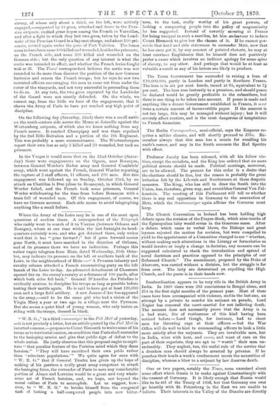" W. R. G.," in a third communique to the
Pall Mall of yesterday, —it is not precisely a letter, but an article quoted by the Pall Mall in inverted commas,—proposes to Count Bismarck to waive some of his terms as to territorial cession, on condition that Paris shall surrender to the besieging armies and give that public sign of defeat to the whole nation. He justly observes that this proposal ought to capti- vate " that peculiar feature of the Parisian mind which they deem heroism." "They will have sacrificed their own pride rather than reluctant populations.' " We quite agree for once with " W. R. G." that if General Trochu has given up the hope of making of his garrison a really great army competent to attack the besieging force, the surrender of Paris to save any considerable portion of Alsace and Lorraine would be a great and very whole- some act of French heroism, and, we hope, not beyond the moral calibre of Paris to accomplish. Let us suggest, how- ever, to " W. R. G." to betake himself from the congenial task of lashing a half-conquered people into new bitter-
ness, to the task, really worthy of his great powers, of lashing a conquering people into the policy of magnanimity he has suggested. Instead of covertly sneering at France for being unequal to such a sacrifice, let him endeavour to induce Count Bismarck to give her the chance of it. If he cannot per- suade that bard and able statesman to surrender Metz, now that he has once got it, by any amount of pointed rhetoric, he may at least convince Englishmen that he himself does not positively prefer a cause which involves an indirect apology for some spice of slavery, to any other. And perhaps that would be at least as valuable a result as any of his letters are likely to produce.


































 Previous page
Previous page